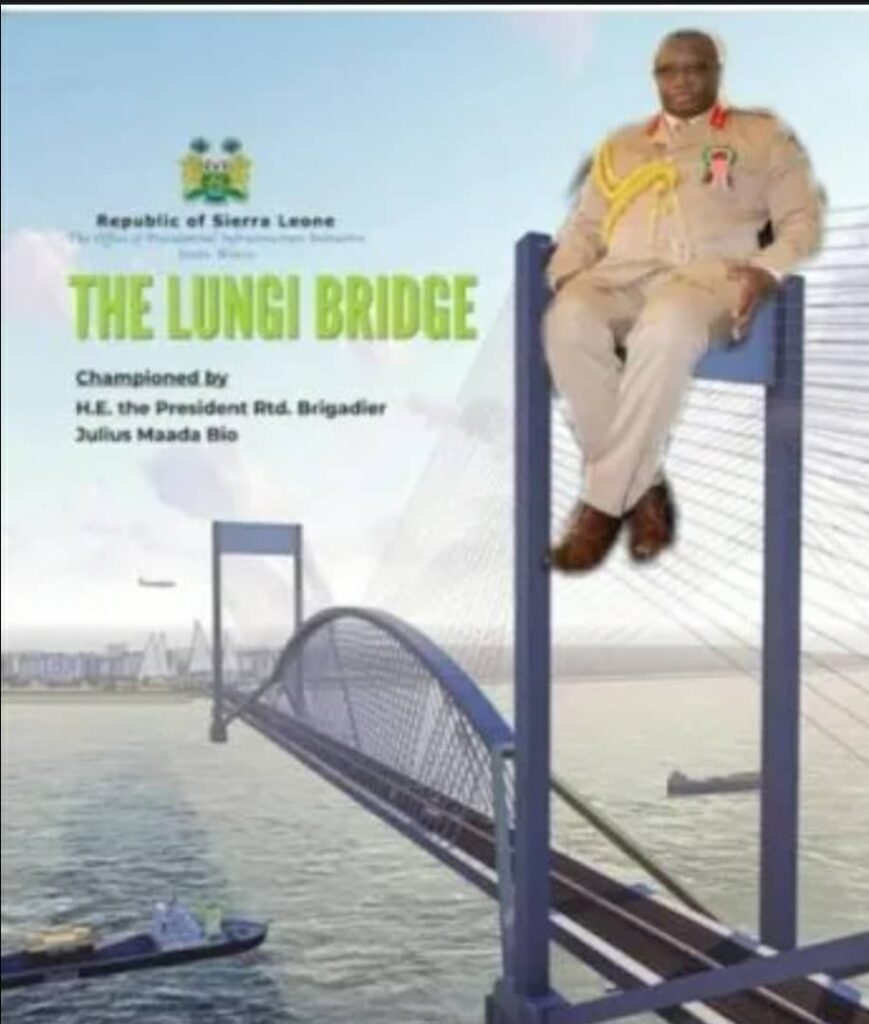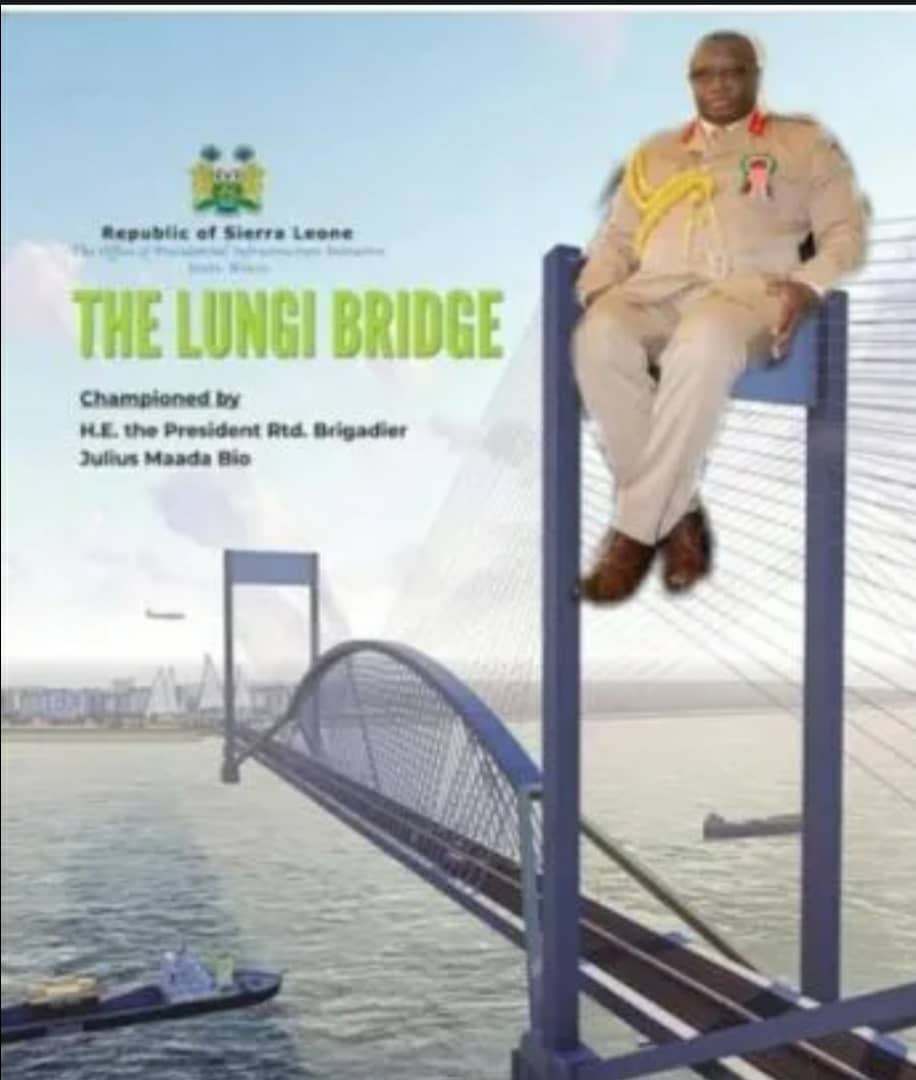
Is the Lungi Bridge a Trap?
By Alpha Amadu Jalloh
Once again, the people of Sierra Leone find themselves staring at what could be the latest deception wrapped in promises of development. The much-talked-about Lungi Bridge, a project that has been dangled before us for years like bait on a hook, has resurfaced. But this time it comes not from our long-standing partners, the Chinese, but from a secretive deal involving the United States of America and a little-known American company called ACRO.
Instead of offering hope, this sudden and silent move has thrown the nation into confusion, anger and deep suspicion. Why was such a monumental announcement not made by our own leaders but by the United States Embassy? Why did our Chief Minister, present at this so-called signing, choose to remain silent? Why are we learning about our future through foreign sources instead of from those we elected to lead us?
Could this be yet another cleverly disguised trap meant to enrich a few and enslave the rest of us to unbearable tolls, long-term debts and foreign control?
Let us be clear. What has been signed is not a binding agreement. It is a memorandum of understanding. A non-committal gesture that expresses the intention to explore a possibility. It has no legal weight. Unlike the formal and well-publicized technology agreements signed by Dr David Sengeh with U.S. agencies, this memorandum is a foggy deal executed in the shadows, devoid of public consultation or parliamentary oversight. Yet the fanfare around it is misleading citizens into thinking the bridge is now a reality.
And let us not forget the irony. Only a few months ago the United States placed Sierra Leone under a travel ban, restricting certain visa categories and implying that we were not complying with international standards. Now the same country reappears with what looks like a game-changing infrastructure project. But at what cost? Are we now supposed to celebrate the sudden generosity of a nation that until recently blocked our entry through its borders?
Most importantly, how is this bridge going to be built? On what model is it based? Is this a Build Own Operate Transfer arrangement where the Americans and ACRO will fund, construct and own the bridge for decades, charging Sierra Leoneans exorbitant tolls before gifting it back to us long after we have paid for it a thousand times over?
If that is the case, for how many years will this foreign ownership last? Who set the toll prices? Will a poor woman traveling from Port Loko to Freetown have to pay more than she earns in a day just to cross a bridge that sits on her own land? Or is the government quietly preparing to plunge us into another cycle of unsustainable loans that will be paid through the taxes and suffering of the next generation?
We have heard nothing from the President. Nothing from the Minister of Finance. Nothing from the Minister of Works and Infrastructure. Just a carefully worded statement from the U.S. Embassy and suspicious silence from the people we expect to speak for us.
And while the Americans are paraded as our new saviors, we are expected to forget our long-time partners, the Chinese, who have contributed significantly to Sierra Leone’s development. From the Youyi Building and Siaka Stevens Stadium to several road and hospital projects. Though the previous Chinese-backed Lungi Bridge deal collapsed due to corruption and poor planning, at least the financing model and scope were openly debated. Now we are being asked to embrace a foreign-led project wrapped in silence and confusion.
This new version of the Lungi Bridge looks more like a public relations gimmick than a development breakthrough. It appears to be nothing more than a desperate attempt by the Bio administration to change the narrative amid economic collapse, crippling electricity shortages and growing public discontent. The bridge is now being used as a distraction. A shiny illusion designed to revive fading political credibility.
But we refuse to be fooled. We demand to know the terms of this memorandum. We demand to know whether it will evolve into a legally binding agreement and if so on whose terms. We demand to know who will fund it, how it will be repaid and what protections are in place to ensure that Sierra Leonean workers and local engineers are not sidelined in favor of foreign interests. We demand to know what environmental and social impact assessments have been carried out, who conducted them and whether affected communities have been consulted.
This is not just about a bridge. This is about sovereignty. This is about economic justice. This is about transparency and the right of citizens to know what their government is signing on their behalf.
Sierra Leoneans are tired. Tired of lies. Tired of being treated like spectators in the affairs that define our lives. Tired of a government that prefers backdoor deals to democratic processes. Tired of having to find out about national decisions from foreign embassies.
The Chief Minister, who reportedly attended the signing, must come forward immediately and explain what was signed, who was involved and what it means for the people. The full text of the memorandum must be made public. Civil society organizations, independent journalists, Parliament and ordinary citizens must have access to the facts. Not rumors. Not propaganda. But real facts.
If the government intends to proceed with this project, it must engage in open national consultations and present the deal in Parliament for scrutiny. Anything less would be a betrayal of trust and a clear indication that this is not a bridge of hope but a trap dressed in concrete and lies.
This is not development. This is deception. And if Sierra Leoneans do not speak up now, we may wake up one day to find ourselves paying foreign tolls to cross our own rivers and walk on our own soil.
Sierra Leone is not for sale. The Lungi Bridge must not be built on lies.
